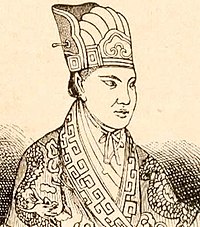Politics of Orioni: Difference between revisions
m (→History) |
m (→History) |
||
| Line 1: | Line 1: | ||
==History== | ==History== | ||
In 1195 new laws were introduced to celebrate 20 years of [[History of Orioni|restoration]]. | In 1195 new laws were introduced to celebrate 20 years of [[History of Orioni|restoration]]. | ||
An executive branch was formed out of the imperial council. The various councillors were still subject to the crown. At their creation, there were four councillors, with the [[Monarchy of Orioni|monarch]] representiving the fifth decisive vote. Each councillor was the head of a specialized department and a geographical area of expertise (several [[Orioni#Administrative divisions|provinces]]). They gave council to the empress, and countersigned (or co-signed) and expedited royal decisions (edicts and declarations). The four departments were: | An executive branch was formed out of the imperial council. The various councillors were still subject to the crown. At their creation, there were four councillors, with the [[Monarchy of Orioni|monarch]] representiving the fifth decisive vote. Each councillor was the head of a specialized department and a geographical area of expertise (several [[Orioni#Administrative divisions|provinces]]). They gave council to the empress, and countersigned (or co-signed) and expedited royal decisions (edicts and declarations). The four departments were: | ||
| Line 8: | Line 8: | ||
* Councillor of the Imperial Household: oversaw the royal entourage, personal military guard, clergy, affairs of the capital, and royal buildings. | * Councillor of the Imperial Household: oversaw the royal entourage, personal military guard, clergy, affairs of the capital, and royal buildings. | ||
An early legislative branch was also formed. The {{wp|States-General|Gizatochi}} was an early precursor to the [[#Executive|Sibiseba]]. It included representatives from the [[List of cities in Orioni#Tamanyi cities|Tamanyi cities]]. | An early legislative branch was also formed. The {{wp|States-General|Gizatochi}} was an early precursor to the [[#Executive|Sibiseba]]. This institutionalised assembly critiqued monarchical decisions. It included representatives from the [[List of cities in Orioni#Tamanyi cities|Tamanyi cities]]. This was expanded in later centuries. | ||
==Monarchy== | ==Monarchy== | ||
Revision as of 09:11, 29 March 2020
History
In 1195 new laws were introduced to celebrate 20 years of restoration.
An executive branch was formed out of the imperial council. The various councillors were still subject to the crown. At their creation, there were four councillors, with the monarch representiving the fifth decisive vote. Each councillor was the head of a specialized department and a geographical area of expertise (several provinces). They gave council to the empress, and countersigned (or co-signed) and expedited royal decisions (edicts and declarations). The four departments were:
- Councillor for Foreign Affairs: oversaw diplomacy and trade.
- Councillor for War: oversaw border provinces.
- Councillor for the Navy: oversaw colonial matters.
- Councillor of the Imperial Household: oversaw the royal entourage, personal military guard, clergy, affairs of the capital, and royal buildings.
An early legislative branch was also formed. The Gizatochi was an early precursor to the Sibiseba. This institutionalised assembly critiqued monarchical decisions. It included representatives from the Tamanyi cities. This was expanded in later centuries.
Monarchy
National government
Executive
- The Imperial Council (Oharic: Memakiriti), created in 1175, which was composed of the 4 advisors of the Empress. The Empress would open her personal correspondence and discuss hearings only in the presence of at least 2 councillors. The Council was considered a very important body of government. Some historians even consider it to be more important than the Monarchy itself.
Legislative
- The Sibiseba (Anglish: Assembly) was established in 1195 as part of the constitutional law reforms, transforming the monarchy into a more deliberative form. The Sibiseba originated as a select committee of fifty nobles, appointed by the Imperial Council, to discuss law abouttaxes, trade, diplomacy, and military matters.
Judicial
Weekly agenda
- Monday: review of legislative by judicial
- Tuesday: Sibiseba meets
- Wednesday: Memakiriti meets
- Thursday: Subcouncils meet
- Friday: Question time of executive by legislative
Local government
Political parties and elections
Types
Alliances
Policy making
Foreign Relations
This template may be deleted.

